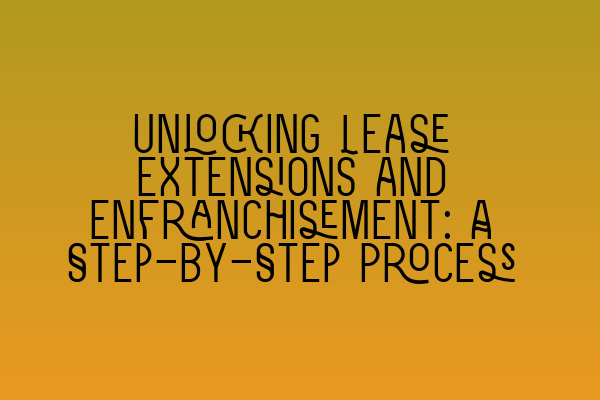Unlocking Lease Extensions and Enfranchisement: A Step-by-Step Process
Welcome to our comprehensive guide on lease extensions and enfranchisement. If you are a leaseholder, understanding the process and your rights can help you secure better terms, gain control over your property, and potentially increase its value. This step-by-step guide will walk you through the process of unlocking lease extensions and enfranchisement, ensuring you have all the information you need to make informed decisions.
Step 1: Determine Your Eligibility
The first step in the process is to determine if you are eligible for lease extension or enfranchisement. The eligibility criteria vary depending on the type of property and the number of years remaining on your lease. Assessing your eligibility will help you determine your rights and the options available to you.
For a more comprehensive understanding of the legal challenges in property transactions, you can refer to our article on Legal challenges in property transactions: A comprehensive guide.
Step 2: Seek Professional Advice
Lease extension and enfranchisement can be complex legal processes, so it’s crucial to seek professional advice from a specialist property solicitor. An experienced solicitor can guide you through the legal intricacies, ensure you meet all the necessary requirements, and protect your interests throughout the process. Working with a solicitor will provide you with peace of mind and increase the chances of a favorable outcome.
Step 3: Valuation and Negotiation
Once you have established your eligibility and secured legal representation, the next step is to determine the premium for lease extension or enfranchisement. This involves valuing the property and negotiating with the landlord or freeholder. Valuation methods can vary, but it typically takes into account factors such as the remaining lease term, market value, and potential for property improvements. Skilled negotiation is essential to ensure a fair premium and favorable terms for the lease extension or enfranchisement.
To avoid common pitfalls and excel in property law questions, you may find our article on Dominate Property Law Questions: Avoiding Common Pitfalls helpful.
Step 4: Serving a Notice
Once the terms have been agreed upon, the next step is to serve a legal notice formally communicating the request for lease extension or enfranchisement to the landlord or freeholder. The notice will specify the terms agreed upon, the premium offered, and other relevant details. It is crucial to ensure that the notice complies with all legal requirements and is served correctly.
Step 5: Responding to the Counter Notice
Upon receipt of the notice, the landlord or freeholder has a specified time frame to respond with a counter notice. The counter notice may accept or propose amendments to the terms set out in the original notice. It is essential to review the counter notice carefully and seek advice from your solicitor to navigate any potential disagreements or objections.
Step 6: Completion and Registration
If an agreement is reached, the next step is to complete the lease extension or enfranchisement. This involves finalizing the legal documents, paying the agreed premium, and updating the property’s records with the Land Registry. The completion process ensures that your rights as a leaseholder or freeholder are legally recognized.
To prepare effectively for your land law exams, check out our article on Land Law Revision Tips: Ace Your Exam Preparation.
Conclusion
Unlocking lease extensions and enfranchisement can be a complex and potentially lengthy process. However, by understanding each step and seeking professional advice, you can effectively navigate the legal intricacies and secure favorable terms. Remember to consult an experienced property solicitor to guide you through the process and protect your interests. Unlocking your lease extension or enfranchisement can provide you with greater control over your property, potential financial benefits, and peace of mind.
For more information on essential considerations for property transactions, you may find our article on Mortgages and land law: Essential considerations for property transactions helpful. Additionally, if you are interested in balancing development and sustainability, our article on Environmental Ethics in Land Law: Balancing Development and Sustainability explores this topic in detail.
